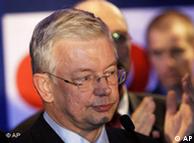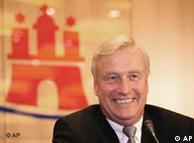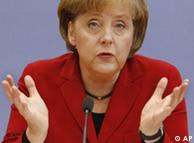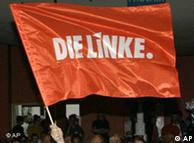Politics | 29.01.2008 /d.welle
German State Elections Shake Up Political Landscape
State elections in Lower Saxony and Hesse have upset the political order, according to analyst Nils Diederich. With the new Left party and the Free Democrats now well positioned, can the top two rethink their tactics?
Nils Diederich is professor emeritus for political science at the Freie University in Berlin. His research focus is elections, domestic policy and political systems.
DW-WORLD.DE: The Left party passed the five-percent benchmark in both Lower Saxony and Hesse in elections on Sunday, Jan. 27, thus winning seats in the state governments. How do you interpret the election results?
Nils Diederich: The election results are an indication that the Left party is beginning to establish itself in western Germany and is able to mobilize a base of supporters. Whether this is a temporary or a lasting phenomenon is something we won't be able to evaluate until the next elections, that is, the federal parliamentary elections [in 2009].
In my opinion, the differences in the election results in Lower Saxony and Hesse show that it's very difficult to determine which way the wind is blowing for the upcoming Bundestag elections. [Hesse's incumbent Premier Roland] Koch showed us that demagogical tactics aren't necessarily successful. Voters in Germany clearly seem to be experienced; they decide on a case-by-case basis and aren't mobilized by slogans meant to inspire fear.
On the contrary, Mr. Koch apparently scared off his own voters. This is evident in the movement toward the Free Democratic Party (FDP). I'm sure that many conservative voters didn't like Koch's style but still wanted to vote conservative and stuck with the FDP in the end.
 Bildunterschrift: Großansicht des Bildes mit der Bildunterschrift: Koch's campaign was openly xenophobic
Bildunterschrift: Großansicht des Bildes mit der Bildunterschrift: Koch's campaign was openly xenophobic
Did the Left party also benefit from Mr. Koch's brutal election campaign?
The amazing thing is that the polarization between [Social Democratic Party candidate Andrea] Ypsilanti and Koch didn't shift all the votes to the Social Democratic Party (SPD). That means that the Left party apparently mobilized its own voters, who were clearly against Koch but didn't see the SPD as a sufficient alternative. In this way, the Left party did benefit from Koch. It was an even bigger advantage that the SPD had lost its credibility among voters, and some of these turned to the Left party.
The Left party is currently represented in nine state parliaments. Will its success continue?
The result is certainly noteworthy for the party landscape -- also at the European level -- but it shouldn't be overestimated. After all, we don't yet know anything about the stability of its voter base.
But in general, it's quite remarkable that the party spectrum in Germany has become even more differentiated.
Will the election results in Hesse and Lower Saxony have an effect on the state elections in Hamburg on Feb. 24?
 Bildunterschrift: Großansicht des Bildes mit der Bildunterschrift: Ole von Beust (CDU) won't repeat Koch's mistakes in Hamburg, said Diederich
Bildunterschrift: Großansicht des Bildes mit der Bildunterschrift: Ole von Beust (CDU) won't repeat Koch's mistakes in Hamburg, said Diederich
I'm very skeptical about that because the results were very state-specific. The effects of Sunday's elections have more to do with the question of whether the leaders of the main parties -- especially the SPD and CDU -- will learn something and change their tactics.
[Hamburg's CDU Mayor Ole] von Beust certainly won't make the mistake of taking on a similar tone to Mr. Koch's but will probably try a gentler approach aimed at the center, like [incumbent Premier Christian] Wulff did [in Lower Saxony]. That does have an effect on the discourse; voters are mostly concerned with state issues at the moment.
Does the Left party have a chance at getting into the state parliament in Hamburg?
I'm not really sure. The voters who say, "I don't want to vote for a party I don't think can make it into parliament," may be encouraged now to vote for the Left party. Specifically, some of the SPD's fringe voters could be persuaded to vote deliberately for the Left party as a way of expanding the left-wing spectrum in parliament.
It's feasible that the Left party will get a boost, especially from the motivation of those supporters who have now realized that it has emerged from the corner of the smallest parties and begun establishing itself in the West. The result could be mobilization.
Some of the media have said that Koch's washout in Hesse means a defeat for Chancellor Angela Merkel, since she supported his campaign. Do you agree?
 Bildunterschrift: Großansicht des Bildes mit der Bildunterschrift: Angela Merkel came out on top, at least indirectly
Bildunterschrift: Großansicht des Bildes mit der Bildunterschrift: Angela Merkel came out on top, at least indirectly
That's a big exaggeration. Merkel was obliged to support Koch's election campaign. The negative outcome for Koch and Wulff's confirmation essentially affirm the chancellor's line. She has perhaps come away all the stronger within her own party, contrary to some people's opinions, since her adopted path has proven to be a winning ticket for future elections, even at the national level.
So Merkel's power isn't threatened?
I don't think she's in any danger. Both [the CDU and SPD] have emphasized they want to continue the [federal ruling] coalition until the end of the legislative period, but that they will then split up. Sunday's results mean they have to reorganize and realign.
And we can't forget the FDP's result, which was an encouragement for it to do everything it can to establish a CDU-FDP coalition after the next federal elections. The FPD came away from the last elections stronger and more stable -- not like the Green party, which didn't lose, but also didn't make any gains.
The results serve mainly to re-sort the party landscape or -- to use a military expression -- to reposition the troops for the next big conflict.

Comments